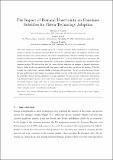| dc.contributor.author | Lobel, Ruben | |
| dc.contributor.author | Cohen, Maxime | |
| dc.contributor.author | Perakis, Georgia | |
| dc.date.accessioned | 2017-09-01T13:01:33Z | |
| dc.date.available | 2017-09-01T13:01:33Z | |
| dc.date.issued | 2015-09 | |
| dc.date.submitted | 2014-01 | |
| dc.identifier.issn | 0025-1909 | |
| dc.identifier.issn | 1526-5501 | |
| dc.identifier.uri | http://hdl.handle.net/1721.1/111095 | |
| dc.description.abstract | This paper studies government subsidies for green technology adoption while considering the manufacturing industry’s response. Government subsidies offered directly to consumers impact the supplier’s production and pricing decisions. Our analysis expands the current understanding of the price-setting newsvendor model, incorporating the external influence from the government, who is now an additional player in the system. We quantify how demand uncertainty impacts the various players (government, industry, and consumers) when designing policies. We further show that, for convex demand functions, an increase in demand uncertainty leads to higher production quantities and lower prices, resulting in lower profits for the supplier. With this in mind, one could expect consumer surplus to increase with uncertainty. In fact, we show that this is not always the case and that the uncertainty impact on consumer surplus depends on the trade-off between lower prices and the possibility of underserving customers with high valuations. We also show that when policy makers such as governments ignore demand uncertainty when designing consumer subsidies, they can significantly miss the desired adoption target level. From a coordination perspective, we demonstrate that the decentralized decisions are also optimal for a central planner managing jointly the supplier and the government. As a result, subsidies provide a coordination mechanism. | en_US |
| dc.language.iso | en_US | |
| dc.publisher | Institute for Operations Research and the Management Sciences (INFORMS) | en_US |
| dc.relation.isversionof | http://dx.doi.org/10.1287/mnsc.2015.2173 | en_US |
| dc.rights | Creative Commons Attribution-Noncommercial-Share Alike | en_US |
| dc.rights.uri | http://creativecommons.org/licenses/by-nc-sa/4.0/ | en_US |
| dc.source | Prof. Perakis via Shikha Sharma | en_US |
| dc.title | The Impact of Demand Uncertainty on Consumer Subsidies for Green Technology Adoption | en_US |
| dc.type | Article | en_US |
| dc.identifier.citation | Cohen, Maxime C. et al. “The Impact of Demand Uncertainty on Consumer Subsidies for Green Technology Adoption.” Management Science 62, 5 (May 2016): 1235–1258 © 2016 Institute for Operations Research and the Management Sciences (INFORMS) | en_US |
| dc.contributor.department | Massachusetts Institute of Technology. Operations Research Center | en_US |
| dc.contributor.department | Sloan School of Management | en_US |
| dc.contributor.mitauthor | Cohen, Maxime | |
| dc.contributor.mitauthor | Perakis, Georgia | |
| dc.relation.journal | Management Science | en_US |
| dc.eprint.version | Author's final manuscript | en_US |
| dc.type.uri | http://purl.org/eprint/type/JournalArticle | en_US |
| eprint.status | http://purl.org/eprint/status/PeerReviewed | en_US |
| dspace.orderedauthors | Cohen, Maxime C.; Lobel, Ruben; Perakis, Georgia | en_US |
| dspace.embargo.terms | N | en_US |
| dc.identifier.orcid | https://orcid.org/0000-0002-9428-7748 | |
| dc.identifier.orcid | https://orcid.org/0000-0002-0888-9030 | |
| mit.license | OPEN_ACCESS_POLICY | en_US |
| mit.metadata.status | Complete | |
